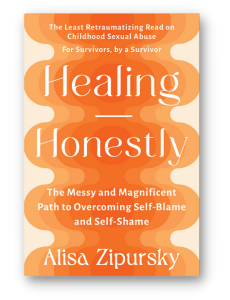After a traumatic event, feeling like everything is your fault is a very common response. When something bad happens to you that’s beyond your control, pretending you can control future events by avoiding mistakes can be a way to regain a feeling of control. The problem is, a habit of blaming yourself can be incredibly painful. And the truth is, no matter how perfectly we behave, we can’t control the behavior of others, so blaming yourself for everything is not aligned with reality.
Why does victim-blaming culture evolve?
Despite the painful and counterproductive nature of self-blame, society and culture often force it on the survivors of traumatic events. There are many reasons victim-blaming culture exists. Accepting that bad things happen to good people is really frightening: what if bad things happen to us? What if our own choices can’t ever fully protect us from negative outcomes? That’s why people are often drawn into the delusion that bad things only happen to bad people. Even if they know better theoretically, they get sucked in by that emotional pull to victim-blaming.
Breaking the pattern of self-blame
 I was no exception. When tragic events happened in my life, I agonized over what I could have done differently and tried to “fix” myself into being a person who wouldn’t suffer again. Being the editor for the book Healing Honestly by Alisa Zipursky interrupted that pattern. The more I edited her work, the more clearly I saw I was internalizing blame that rightly belonged to systems, power structures, and perpetrators. I needed to stop.
I was no exception. When tragic events happened in my life, I agonized over what I could have done differently and tried to “fix” myself into being a person who wouldn’t suffer again. Being the editor for the book Healing Honestly by Alisa Zipursky interrupted that pattern. The more I edited her work, the more clearly I saw I was internalizing blame that rightly belonged to systems, power structures, and perpetrators. I needed to stop.
One small example: “What can I change about my dating profile to avoid getting harassed on dating apps? What’s wrong with me?” became, “We live in a shitty patriarchal system that trains people to dehumanize women and see them as objects. I’m going to curse out that system until I feel better.” The more I train my brain into this new pattern, the lighter I feel, like taking off a backpack full of rocks. It frees me up to focus on the things I CAN control and the ways I CAN grow. It feels better than the futile exercise of trying to make myself so small I won’t be targeted.
Check out our talk on trusting yourself to learn more.
Examples of fighting victim-blaming logic
Victim blaming is a lot more insidious, pervasive, and universal than most of us realize. We tend to be aware of only the most common and obvious forms of it. For example, after decades of feminist activism, most people know that asking a rape victim “What were you wearing?” is an example of victim-blaming and isn’t okay. However, few people understand that blaming other people and yourself for what you couldn’t control is practically a default. It’s a scripted way of reacting to traumatic experiences.
For clarity and perspective, here are examples of victim-blaming reactions to tragedies other than sexual assault:
- “I have a chronic illness.” → “Are you leading a healthy enough lifestyle?”
- “I was fired from my job.” → “Did you make sure to play office politics?”
- “My parents don’t accept my gender.” → “Did you communicate and provide resources to help them understand?”
- “I have too much work and am behind on my tasks.” → “Have you tried being more organized?”
- “My spouse doesn’t do their share of chores.” → “Have you asked them to do their share?”
And here are examples of reactions to those same tragedies that wouldn’t blame the victim:
- Our ableist society is terrible at accommodating chronic illness. How can I make your life easier? Do you want me to bring you some food?
- It’s wrong that our capitalist culture views workers as disposable, no matter what a good job they do and how hard they work. The layoff culture is also terrible for product quality; I think it’s nothing but an executive power trip, myself. Do you want help rewriting your LinkedIn profile?
- I know how much you value your parents and I’m sure you did everything in your power to help them see your point of view. Your heart must be breaking. How can I help? Would you like to go to Pride with me?
- We deserve reasonable workloads and time to take care of ourselves, but the world isn’t set up for that. I know how hard you are trying, and you should give yourself more credit.
- Studies show that household labor is inequitably shared between men and women and that men overestimate the work they do, so I am not surprised to hear you’re frustrated. It’s a pattern that needs to break. I know so many parents today who are conscientiously raising their sons to do their fair share.
Never confuse blame and shame with accountability
I used to think scolding myself for my mistakes was the way to avoid making them again. But really, there’s a world of difference between shame and accountability. When you shame yourself, you convince yourself that something is wrong with you. That comes with a feeling of being doomed, and it is paralyzing, preventing action. When you hold yourself accountable, you realize the tremendous power you have to make the world a better place by turning away from a harmful path of action.
You’ll see when you read Alisa’s book that she loves telling stories about her own petty or embarrassing moments and her own faults. However, she recounts her missteps with tremendous cheerfulness and overwhelming joy at laughing at herself. Yes, many people can laugh at themselves, but I’ve never met anyone who laughed at herself as loudly or as often as Alisa.
I noticed that when she laughs at her mistakes, shame seems to hold less power. Listening to her laugh helped make the heaviness of my own mistakes feel lighter. The pages of Healing Honestly are suffused with that laughter, and I hope reading it makes you feel lighter too.
When do we reach the end of shame?
Years ago, when I first read Sonya Renee Taylor’s book proposal for The Body Is Not an Apology, radical self-love was a new concept for me, and I was struggling to wrap my mind around it. So I asked Sonya, “I think I understand what radical self-love is from what you’re saying… it’s like, when you stop reproaching yourself and trying to fix yourself, and just love the way you are. So, how long does it take? When do you reach the point when you’ve fully accepted yourself?”
Sonya threw her head up in the air and laughed and laughed and laughed. “I’m still waiting,” she finally said. “Oh, I wish, I wish so much you could reach a point where you were just DONE. But it doesn’t work like that.” (It reminded me of when I asked my grandmother, “When do you finish growing up?” and she said the same thing: “I’m still waiting!”)
We’re not ever fully free of shame, but we CAN make it a little lighter every day. And a big part of that is understanding that the voice of shame doesn’t come from our deepest soul; it comes from the power structures around us. (There’s a course by Sonya Renee Taylor and adrienne maree brown about learning to listen to that deepest soul voice if you’re interested).
The shame isn’t yours, it’s theirs
I’ve heard way more self-blame and self-shame from the people around me since the pandemic. That’s not a coincidence! Our minds, bodies, and hearts are carrying the trauma from the pandemic and related events, which slows us down and makes us less effective. And we turn on ourselves and snap at ourselves for that slowness. Which slows us down even more. How can we stop that vicious cycle?
There are concepts that interrupt that cycle. The other day I went to a book talk by Elliot Page and an audience member asked Elliot, “I work at a middle school, and the queer youth there are really struggling. What would you tell them?” Elliot replied, “I would tell them: The shame you’re carrying? It’s not yours, it’s theirs.”
That’s what our company’s all-time bestselling book, Leadership and Self-Deception, teaches as well. The book explains that when we make the decision not to help someone else, we betray our deepest inner impulses toward goodness. In response to that self-betrayal, we attack the person who needs help in order to justify the action we’ve taken abandoning them.
When we meet a survivor of tragedy, the shame we feel at refusing to help them runs deep. So we try to shift that shame from ourselves to the survivor. “It’s your fault. You did something wrong. You don’t deserve my help,” is the way we try to feel better about ourselves for not helping. It’s time to stop blaming ourselves and others. The enemy isn’t people; the enemy is shame itself.




